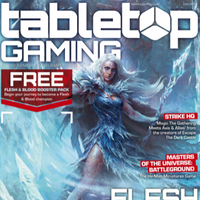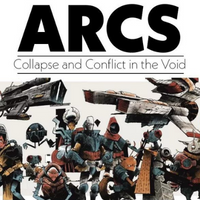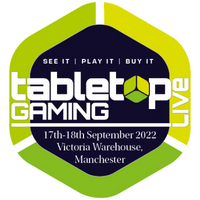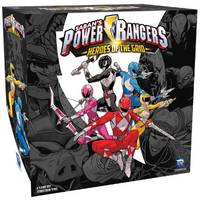13 November 2022
|
Dungeons & Delegations
Words by Richard Jansen-Parkes Artwork courtesy of Wizards of the Coast
Most GMs absolutely love running games. We love plotting story arcs, crafting cunning NPCs, and working through our extensive library of evil voices. We revel in luring heroes into clever traps, forcing them into moral quandaries, and rolling an absolute mountain of dice in a single turn.
We often pay the price for this enjoyment, however. For some reason, which has never quite been made clear to me, everybody seems to have agreed that the GM is responsible for running the game, preparing maps, organising miniatures, arranging the venue, setting up the schedule, buying snacks, making sure everyone has something to write with, making sure that everyone has something to roll with, buying the rulebooks, reading the rulebooks, teaching the players the rules, teaching the players the rules again, printing the character sheets and remembering the name, hairstyle and accent of every NPC that the party have ever met.
The players, meanwhile, are responsible for showing up on time. If possible.
To be honest, this does not seem like the optimal division of labour. Even if GMs are usually willing to shoulder the manticore’s share of the organisational burdens, this doesn’t necessarily make it a good idea. GM burnout is a genuine phenomenon, and part of this can be attributed to all the non-game nonsense they need to deal with week-in and week-out.
A BURDEN SHARED…
Some of the responsibilities tend to naturally fall to the GM. Most of the time, they’re the person who needs the most in-depth rules knowledge, so it makes a kind of sense for them to take the lead in that area, for example. However, this isn’t a universal rule.
There are countless minor areas where players can step up and relieve some of the weight on their GM’s shoulders. Not only does this help reduce the risk of the game collapsing into a pile of burnt-out mung when the GM finally cracks, it can also help the players become more invested in the game as a whole. Let’s introduce an entire new cast of roles into the game…
RULES WARLOCK
Even the most extraordinary GMs don’t always know every rule for every game they run. Even if you’d swear that you know a system back-to-front, inventive players always find a way to do something new and wildly unexpected that leaves you reaching for the rulebook.
However, while it’s often assumed that the GM has to act as the de facto rules-meister, that’s rarely written down anywhere. In fact, any one of the players can check the rules just as well as the GM can, so long as they have access to the books.
Appointing a player to act as the table’s ‘rules warlock’ (as with D&D warlocks, they’re people who have made a faustian bargain with a higher power – in this case, a GM rather than a demon) can work wonders. Whenever the group runs into an exciting rules query, it’s their job to look things up and clarify the matter. Then, the GM can get on with running the game without having to bring proceedings to a halt.
Indeed, you don’t even need to bring anything to a stop. Often, the best way to deal with a potential rules snafu is to make an on-the-spot ruling and task the rules warlock with looking up the by-the-book answer once the session has ended. This keeps the flow going nicely, while helping you stand prepared the next time the party tries to argue that the invisible stalker can’t actually see them, because the light is passing right through the monster’s translucent eyeballs…
PRINTSPERSON
Most RPGs are heavy on paper. From character sheets to notes and maps, many of the game’s essential details need to be noted down on bits of dead tree before they become real.
While most players probably won’t be able to print off the GM’s notes for them – if only because those notes were written on the bus ride to the venue – they can still volunteer to sort out the character sheets and handouts.
Someone with easy access to an office printer and a relaxed IT policy would be ideal. If this isn’t the case, it’s still easy for most people to hop onto a home or library computer and inkjet out a few copies. This may require a modest contribution from the rest of the table to cover ink cartridges and/or printer fees.
This role doesn’t instantly become redundant just because you’re running a game online. For example, rather than securing physical copies of the necessary handouts, the role can morph into checking that the digital character sheets and handouts are uploaded and maintained properly.
SNACK BUYER
Few roles at the table are less appreciated than the humble snack buyer. After all, whether we’re talking apples or pizzas, everyone likes having something to munch on during moments of high stress.
In many groups, this task defaults to the GM – mainly because the GM is also usually the host. However, even if people tend to share the burden, it can still be wise to designate a dedicated snack buyer.
This can help to avoid the perils of poor communication, which can lead to either A) Everybody bringing way too many snacks, because they all assumed nobody else was going shopping, or B) Nobody bringing snacks, because last week everybody brought way too much stuff.
SCRIBE
Solid notes are a vital part of any RPG. Unless you’re running through an entire campaign in a single session – and good luck to you if you are - the players and the GM alike need a way to remember just what the heck happened the last time you met up.
If someone isn’t writing all this stuff down, you end up blurring a half-dozen NPCs into a single weird entity, or forgetting that the rogue murdered the town mayor two months ago.
As usual, this role tends to default to the GM. This doesn’t need to be the case, however. It can be helpful to ask one player to act as the party’s official scribe. They are usually expected to maintain decent notes, help the GM with minor details as needed, and launch off the traditional pre-game catch-up.
CARTOGRAPHER
Not every RPG out there needs a map, but plenty of them can – at the very least – benefit from getting something down on paper.
This is one of the roles that arguably belongs in the GM-exclusive realms. Most of the time, the dungeons and cities the party is exploring are plucked directly from their mind, and asking a player to fill it in ahead of time can reveal vital information long before it should be revealed.
This doesn’t mean that you can’t come to a compromise, however. Ideally, a team cartographer should have the job of mapping out dungeons or other environments that might benefit from having a drawing. As well as this, they can be tasked with sketching out details on any battle-maps the team might need.
The GM might task them with drawing out the room they just described on a blank mat, for example, while they are bust sorting out miniatures and checking stat-blocks. It helps to give the cartographer a bit of leeway here – allow for flourishes or cool additions to the room when it makes sense. This helps the party see the environment as more alive and accessible than just a blank box filled with enemies.
I’ve had players idly sketch vents that they’ve used as escape routes ten minutes later and ladders that lead to an as-yet-unmentioned second story.
The GM usually has veto over all additions, but that doesn’t stop the process from being enjoyable.
Looking for more?

This review came from Tabletop Gaming Magazine, which is home to all of the latest and greatest tabletop goodness. Whether you're a board gamer, card gamer, wargamer, RPG player or all of the above, find your copy here.
Get your magazine hereRead More...

If you want to read more about one of the most hotly anticipated games of the year, check out our interview with Cole Wehrle on ARCS! A new game from the designer of Root and Oath, and we've got all you need to know.
To infinity and beyond
Join us in person

We can't wait for Tabletop Gaming Live 2022! An epic weekend in Manchester full of board games, card games, roleplaying games, wargames and more, with amazing exhibitors, great games, and an opportunity to game together in person.
See you there!Treat Yourself!

Have you visited our game store? We have everything from mystery boxes, to games and accessories – including the above Power Rangers: Heroes of the Grid, with a great discount! Head over to find your new favourite game.
Visit the Game Store
Sometimes we may include links to online retailers, from which we might receive a commission if you make a purchase. Affiliate links do not influence editorial coverage and will only be used when covering relevant products








Comments
Login or register to add a comment
No comments